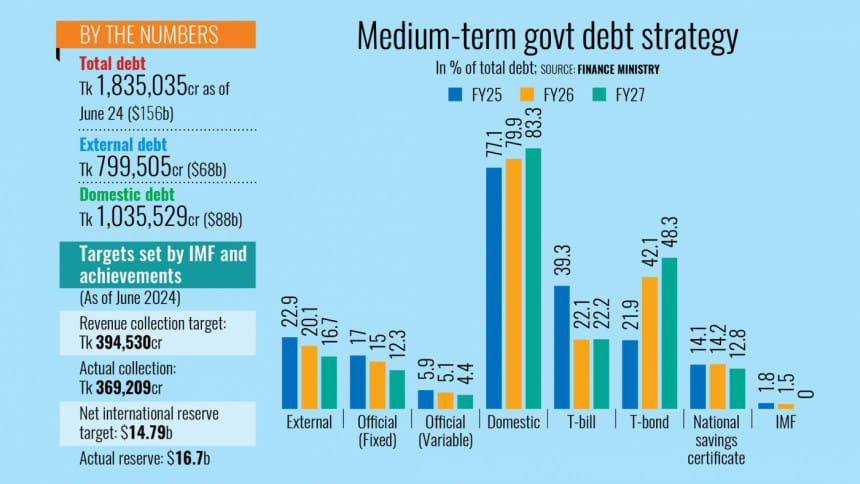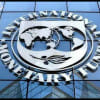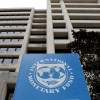Bangladesh on track for next IMF loans

Bangladesh is on track to meet all 12 conditions set by the International Monetary Fund (IMF) to qualify for the fourth tranche of a $4.7 billion loan programme, only missing the revenue collection target.
This comes as an IMF mission, led by mission chief Chris Papadakis, is set to visit Bangladesh from December 3 to 17 to review the country's performance and compliance with structural reform conditions.
The team will meet with Finance Adviser Salehuddin Ahmed on December 3, finance ministry officials told The Daily Star.
During their stay, the IMF team will also hold meetings with officials from the Bangladesh Bank, the finance ministry, the power and energy ministry, the National Board of Revenue, and the Bangladesh Bureau of Statistics.
There are seven performance criteria for which the IMF has set specific floor or ceiling figures to be achieved by June 2024.
These conditions include net international reserves, budget deficit, accumulation of external payment arrears, reserve money, tax revenue, priority social spending, and capital investment undertaken by the government.
According to a finance division official, the government has met six of these conditions but failed to achieve the revenue collection target.
As per the IMF target, the government was supposed to collect Tk 394,530 crore in taxes by June.
Data from the Finance Division showed that the government collected Tk 369,209 crore by June, meaning it fell Tk 25,321 crore short of the IMF target.
Another major condition set by the IMF was to increase the country's net international reserves, which was fulfilled after the IMF lowered the required threshold in May this year upon request by the then government.
The initial target was $20.11 billion by June 30. However, the IMF lowered it to $14.79 billion later in May. As of June 30, Bangladesh had $16.7 billion net international reserves.
Bangladesh failed to fulfil this target for each previous instalment of the loan package.
The IMF's loan programme contains two types of conditions: seven linked to performance criteria and the remaining related to structural benchmarks.
Officials said Bangladesh was scheduled to meet five structural reform conditions out of 27 by June.
The IMF team will assess whether Bangladesh met these five conditions and will also review other structural reform conditions to be met at different times from September this year to December next year.
One of the structural reform conditions was the publication of an updated medium-term debt management strategy, covering FY25 to FY27. The finance ministry has already published it.
According to the publication, it is crucial for Bangladesh to move towards a unified debt management framework gradually to enhance the country's public debt management.
"Under this framework, all aspects of public debt management, from the issuance of treasury securities to the oversight of national savings certificates and external borrowing, among others, should be conducted under the Finance Division through an autonomous unit," it said.
Capacity development of the debt management unit in this regard will help to ensure better implementation of the debt strategy and maintain public debt on a sustainable trajectory, it added.
An official from the finance ministry said the report was formulated at the end of the previous government's tenure. The interim government or the next elected government may introduce changes.
Finance ministry officials said that other macroeconomic challenges, including inflation, subsidy reductions and reforms in revenue collection, would be discussed during the IMF team's visit.
The interim government will also share updates on steps taken to generate authentic statistics.
The total arrears of the government subsidy in the power, fertiliser, and energy sectors amounted to approximately Tk 60,000 crore at the end of June. Discussions with the IMF mission will prioritise how subsidies in these sectors can be reduced, according to the officials.
On top of the ongoing $4.7 billion programme, the government has already sought an additional $3 billion loan from the IMF.
An official from the Bangladesh Bank said this will be discussed in detail with the visiting IMF mission. To avail of that loan, the government, however, will be required to meet additional conditions set by the IMF.
Zahid Hussain, a former lead economist at the World Bank's Dhaka office, said the IMF's upper management is positive about providing additional loans.
"But specific conditions must be fulfilled by the government," he said.
These conditions could relate to the banking sector, tax policy, subsidy reductions, exchange rate management and more, he added.
Hussain said it is still unclear whether the new loan will be incorporated into the existing loan package or offered in a different form.
In the face of mounting pressure on its foreign reserves, Bangladesh sought IMF assistance at the end of 2022. The multilateral lender approved $4.7 billion in January 2023. Of that, the government has already received $2.3 billion in three tranches.

 For all latest news, follow The Daily Star's Google News channel.
For all latest news, follow The Daily Star's Google News channel. 







Comments